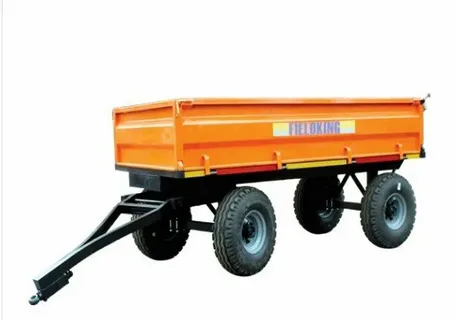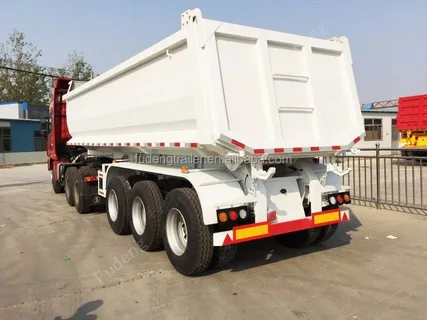Are you looking for a reliable and efficient solution for hauling heavy loads? Look no further than tipping trailers. These versatile trailers are designed to make transporting materials easy and safe. In this blog post, we will explore the benefits of using tipping-trailers, the different models available, key features to look for, practical applications in various industries, maintenance tips, and how to choose the right tipping trailer for your needs. Whether you are a farmer, landscaper, or construction worker, tipping-trailers are the ultimate solution for efficient hauling.
Understanding the Basics of Tipping-trailers
Tipping-trailers, integral to various sectors for their ability to efficiently transport and unload materials, are equipped with a hydraulic lifting mechanism. This pivotal feature enables the trailer bed to elevate at an angle, facilitating the effortless discharge of its contents. Predominantly, these trailers are employed for moving loose materials such as soil, gravel, and sand, which are staples in industries like construction, agriculture, landscaping, and waste management.
The functionality of tipping-trailers hinges on a hydraulic system, a sophisticated yet user-friendly setup that automates the tipping process, reducing manual labor and enhancing operational efficiency. As a result, they have become indispensable in scenarios where rapid and safe unloading of materials is paramount. The design of these trailers also prioritizes user safety and material security during transportation, ensuring that loads are contained securely until they reach their destination.
Given their robust construction and their pivotal role in material handling and transportation, understanding the operational mechanics, the types of materials they can carry, and the specific industries they serve is crucial for anyone considering their use. This foundation is essential for appreciating the versatility and functionality of tipping-trailers to businesses and professionals across various fields.
The Diverse Range of Tipping Trailer Models
The market boasts many tipping trailer models for varying needs, from compact single-axle trailers ideal for light residential use to robust, heavy-duty models designed for commercial applications. These trailers are available in many sizes and capacities, ensuring a suitable option for every task, whether for farming, construction, or any other heavy-duty hauling requirement.
Unique features tailored to enhance functionality and user convenience can be found across different models. For instance, some are equipped with mesh sides to secure loose material during transit, whilst others incorporate ramps and drop-down tailgates, simplifying the loading and unloading process. The choice of material from which these trailers are constructed, such as high-grade steel or lightweight aluminum, further adds to their durability and suitability for various tasks.
Customization options are often available, allowing potential buyers to specify certain features that would best meet their operational needs. This level of variety ensures that regardless of the specific requirements or budget constraints, one can find a tipping trailer that meets and exceeds expectations. This diversity reflects the industry’s commitment to providing versatile, practical solutions for efficient material handling and transportation across various sectors.
Key Features to Look for in a Quality Tipping Trailer
Selecting the ideal tipping trailer demands attention to detail and understanding the critical attributes that elevate its functionality, safety, and longevity. The material from which it is fashioned is essential to the core structure of a high-quality tipping trailer; steel offers unmatched durability and resilience, whilst aluminum provides a lightweight alternative without compromising strength. The hallmark of a superior trailer is its hydraulic tipping mechanism, which should operate seamlessly to enable swift and effortless unloading. This system’s efficiency is paramount, significantly reducing manual effort and enhancing operational productivity.
Equally important is the stability of the trailer during transit and tipping operations. Robust tires equipped with high-grade suspension systems contribute to a smooth ride, even on uneven terrains, ensuring the cargo’s integrity and the safety of the road users. The trailer’s capacity and dimensions are crucial; they must align with the user’s specific requirements, whether for minor landscaping projects or construction tasks. Versatile features such as adjustable mesh sides, drop-down tailgates, and integrated ramps further signify a well-designed trailer, catering to a wide range of loading and unloading scenarios.
Finally, it is advisable to assess the availability of customization options and after-sales support from the manufacturer, as these factors can significantly enhance the trailer’s utility and ensure its longevity and consistent performance. By prioritising these key features, purchasers can make an informed decision, securing a tipping trailer that reliably meets their hauling needs.
The Benefits of Using Tipping-trailers for Hauling
Enhanced Efficiency: The hydraulic lifting mechanism allows for quick and effortless unloading of materials, significantly reducing manual labor and saving time.
Versatility:
Suited for various materials and applications across different industries, from agriculture to construction, making them a highly adaptable solution.
Safety:
Designed with operator and load safety in mind, tipping-trailers feature mechanisms and designs that secure the load during transportation and ensure a safe tipping process. – **Cost-Effectiveness: Tipping-trailers can lower operational costs by streamlining the unloading process and reducing the need for additional equipment or manual labor.
Durability:
Constructed from high-quality materials like steel or aluminum, these trailers are built to withstand heavy use and harsh conditions, ensuring long-term reliability.
Ease of Use:
Their straightforward operation, often with simple hydraulic controls, makes them accessible to users with varying experience levels.
Customizable:
With options for customization, users can tailor the trailers to their specific needs, whether adding mesh sides for securing loose materials or integrating ramps for more effortless loading.
Improved Productivity:
Their ability to transport and unload heavy loads quickly and safely means tasks can be completed more efficiently, enhancing overall productivity.
Practical Applications of Tipping-trailers in Various Industries
Construction: Tipping-trailers are essential on construction sites for transporting and unloading bulk materials such as sand, gravel, and demolition waste. Their sturdy design can withstand the harsh conditions of construction environments, making them a crucial asset for efficient site operations.
Agriculture:
Farmers rely on tipping-trailers for various tasks, including transporting feed, grain, and other agricultural produce. They are also used for clearing debris and distributing fertilizer, proving their versatility and usefulness in farming.
Landscaping:
In landscaping projects, tipping-trailers are used to haul soil, mulch, and plant materials. They facilitate the easy distribution of landscaping supplies, helping to transform outdoor spaces with efficiency and ease.
Waste Management:
For waste collection and management operations, tipping-trailers effectively transport large volumes of waste material to recycling centers or landfills. Their tipping mechanism ensures that waste can be unloaded quickly and safely.
Mining and Quarrying:
In mining and quarrying industries, tipping-trailers carry extracted materials such as coal, minerals, and quarry stones from the extraction site to processing locations. Their heavy-duty construction ensures they can handle the rugged terrain and heavy loads typical of these industries.
Forestry:
Tipping-trailers aid in transporting timber and logging residues. Their strength and capacity make them suitable for the demanding conditions of forestry work, helping to move logs and other forestry products from woodland areas to mills or storage sites.
Maintenance Tips to Extend the Life of Your Tipping Trailer
Maintaining your tipping trailer in optimal condition is vital for ensuring its reliability and longevity. Regularly inspect the hydraulic system for any signs of leaks or wear, which is crucial for the smooth operation of the tipping function. Keeping the hydraulic fluid at the recommended level and replacing it according to the manufacturer’s guidelines is essential.
The trailer’s structural integrity should be noticed; check for any signs of rust or corrosion, particularly in areas prone to moisture accumulation. The tires also demand attention; ensure they are always inflated to the correct pressure and replace them if signs of excessive wear or damage are evident.
Additionally, greasing all moving parts, including hinges and locks, will prevent them from seizing and reduce wear. Keeping the trailer clean, especially after transporting materials that could lead to corrosion or blockages in the hydraulic system, will also contribute to its extended usability. Adhering to these maintenance practices will significantly enhance the performance and lifespan of your tipping trailer, safeguarding your investment.
How to Choose the Right Tipping trailers for sale?
Selecting the appropriate tipping trailers for sale necessitates a comprehensive evaluation of your specific requirements and the tasks at hand. Firstly, assess the load capacity you frequently handle, as this will determine the size and strength of the trailer needed. A smaller, single-axle trailer may suffice for individuals involved in light gardening or landscaping work.
Conversely, for those in construction or agriculture dealing with heavier loads, a larger, dual-axle model would be more appropriate. Consider it’s the type of materials you intend to transport; volume might be more critical than weight capacity for bulky but lighter materials. Additionally, the towing vehicle’s specifications must be considered to ensure compatibility and safe operation. Investigate the trailer’s construction material, favoring durable options like high-grade steel for heavy-duty use or aluminum for lighter, rust-resistant alternatives.
Depending on your cargo, removable sides or additional accessories like tarps and nets might be necessary; lastly, reflect on the future growth of your operations or possible changes in material handling needs, opting for a trailer that offers flexibility and room for scalability. Engage with reputable dealers who provide robust after-sales support and warranty, protecting your investment.
 Conclusion
Conclusion
Tipping trailers stand as a pivotal solution to the myriad challenges of material transportation and unloading across diverse sectors. Their inherent versatility and efficiency not only streamline operations but also significantly enhance safety and cost-effectiveness in the workplace. The array of models on offer caters to a wide spectrum of industry requirements, ensuring that there is a tipping trailer to suit every specific need, be it in agriculture, construction, landscaping, or beyond. Through careful consideration of key features, potential buyers can secure a trailer that not only aligns with their current demands but is also poised to accommodate future growth and changes in operational scope.
FAQs
Q: Are there specific types of loads that tipping trailers are best suited for?
A: Tipping trailers are incredibly versatile and ideal for a wide range of materials, including but not limited to, construction debris, agricultural produce, soil, and landscaping materials. Their design caters to the efficient transport and unloading of both heavy and bulky loads.
Q: Is operating a tipping trailer complicated?
A: Not at all. The hydraulic systems in tipping-trailers are designed for ease of use, allowing operators to easily lift and tip the trailer to unload its contents with minimal effort. This simplifies operations significantly, even for those with limited experience.
Q: How do I determine the most appropriate tipping trailer size for my needs?
A: The ideal size and capacity of a tipping trailer depend on the nature of the materials you intend to transport and the weight and volume you typically deal with. Assessing your regular hauling needs, in conjunction with the towing capacity of your vehicle, will guide you in selecting the most suitable trailer size. Consulting with experts at reputable dealerships can also provide you with tailored advice to ensure you make an informed choice.
Q: Can tipping-trailers be customized to suit specific requirements?
A: Yes, many manufacturers offer customization options for tipping-trailers. These can range from selecting specific materials for construction to adding features such as mesh sides or ramps to enhance functionality based on your specific hauling and unloading needs.
| Other Good Articles to Read |
| skank blogs |
| unreal blogs |
| tba blogs |
| all city forums |
| dany blogs |
| refuge blogs |
| the music blogs |
| key forums |
| the big blog theory |
| joe blogs |
| blogs 4 me |
| Blogs Emon |
| Related Business Listings |
| Contact Directory |
| Local Business Profiles |
